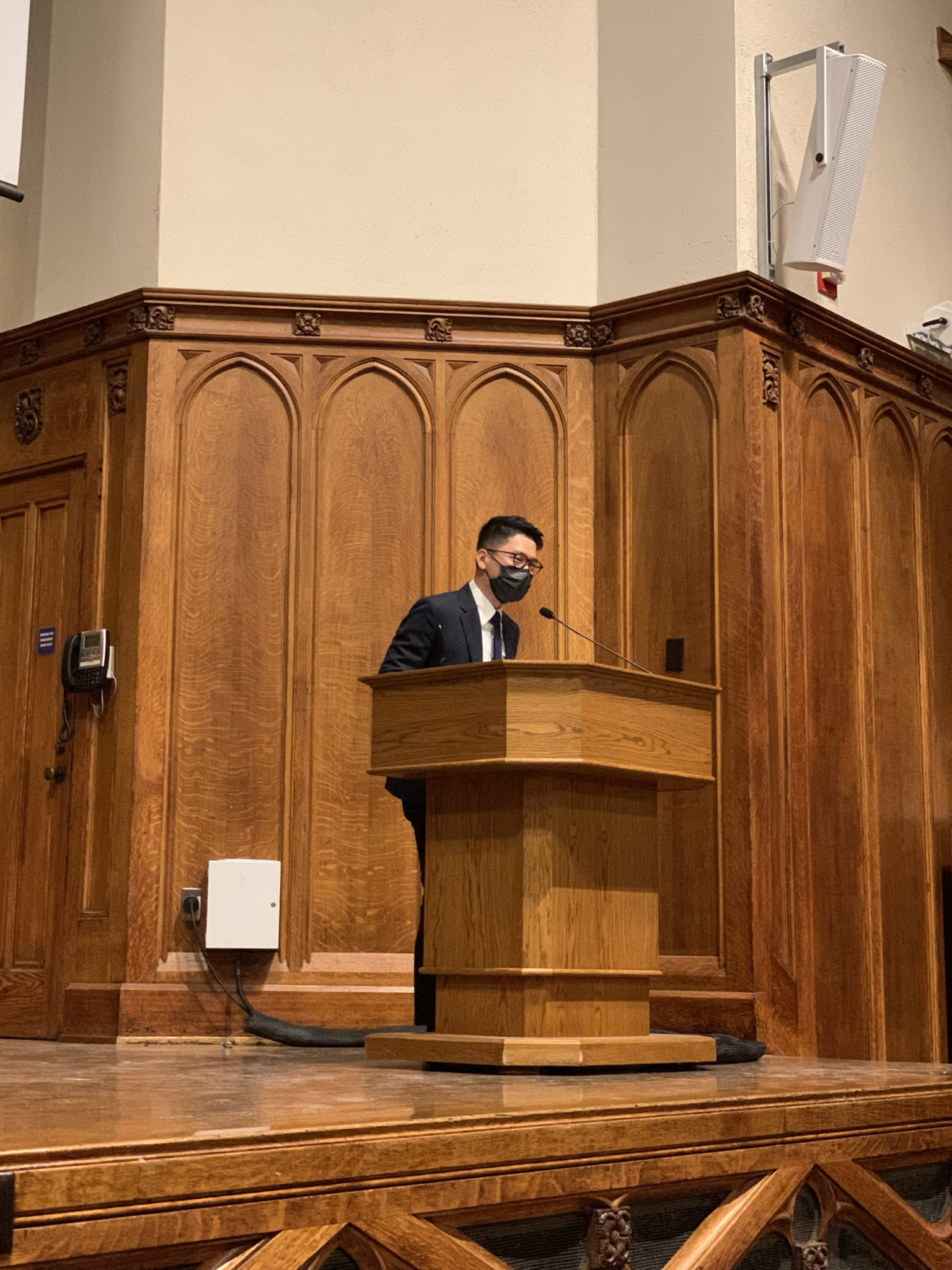Yale Political Union returns to in-person debate
The YPU met in person Monday night for a debate about Hong Kong’s fight for self-determination.

Courtesy of Calista Washburn
The Yale Political Union, or YPU, hosted its first in-person debate Monday evening since the COVID-19 pandemic began, focusing on the validity of Hong Kong’s fight for self-determination and considerable political autonomy from China.
The debate, titled “Self-Determination For All,” featured guest speaker Nathan Law GRD ’20, an advocate for Hong Kong’s self-determination from China. In his speech, Law strongly advocated for the recognition of Hong Kong’s political autonomy, expounding upon China’s inability to uphold the “one country, two systems” doctrine they implemented when they inherited Hong Kong from the British Government in 1841. After Law’s initial speech, the debate broadened to a discussion on free will and its implications on national sovereignty.
“What’s more meaningful to your personal life than protesting the tyrannies raised against your nation?” Law posed to the captivated audience of students. “We know it’s an imbalanced fight but we had no choice. We had to try to use the power we had to make a change. What the protestors have is the power of the people.”
As the first in-person debate held in 18 months, the event was marked by uncertainty. The overall return to the physical political debate platform was punctuated by students adjusting to the intensity of formal public speaking, event coordinators unsure of when capacity had been reached and visitors unfamiliar with the formalities of the event.
Ali Brown, vice president of the Political Union, highlighted the benefit of an in-person debate.
“While it’s been difficult to coordinate all the moving parts to arrange an in-person event, it’s definitely worth the atmosphere and engagement that you can only get in person,” Brown told the News.
The event began with Law, who is currently living in exile from Hong Kong due to fear of prosecution from the Chinese government, speaking of his personal experience with political advocacy in Hong Kong.
Throughout his speech, he emphasized how he views it as a necessity to support Hong Kong’s self-determination because he feels that the Chinese government is trampling on the core values and rights of the people of Hong Kong.
Closing out his speech, Law said that “the Chinese government’s promise to Hong-Kong was a lie. They do not honor the promises of democracy, autonomy and freedom they gave to the people.”
At the culmination of Law’s speech, hushed whispers rang out throughout the crowd, as students asked one another questions such as, “What is self-determination?” “Is it a privilege?” “Does it apply to everyone?” The majority of the debate following Law’s speech focused on a philosophical probing of the nature of free-will within the political sphere.
Kennedy Anderson ’25, a member of the YPU’s Independent Party, told the News that experiencing the Union’s signature debate format, which involves participation from the crowd in the form of banging on chairs and hissing, was “overwhelming.” Still, she found the topic of the debate to be interesting.
“Hong Kong was merely the launching pad for a broader discussion on the feasibility of democracy given humans’ affinity for choice,” Anderson said.
But not everyone agreed with Law’s characterization of self-determination. A member of the Independent party, speaking in opposition to Law, talked about the risks of the political revolution that could follow Law’s proposed path of self-governance for Hong Kong.
At the conclusion of the debate, students overall agreed that the answer to the self-determination problem in Hong Kong ought to seek a balance between protecting the rights of the group and the rights of the individual. They differed, however, on whether this should be executed through a democratic revolution or a reformation movement on Chinese governing policies over Hong-Kong.
First time debate attendee Nikita Paudel ’25 told the News that the debate helped her see a new side to Yale’s political scene.
“Attending the YPU debate in person was overwhelming — it felt like I was thrown into a different world,” Paudel said. “But it was exciting. Everyone was so passionate about their ideas toward political philosophy that it was nearly impossible to not get riled up alongside them.”
Uniting Yale’s seven constituent political groups, the Yale Political Union is the oldest collegiate debate society in America, present since 1934 in its role as the University’s primary space for political oratory.










